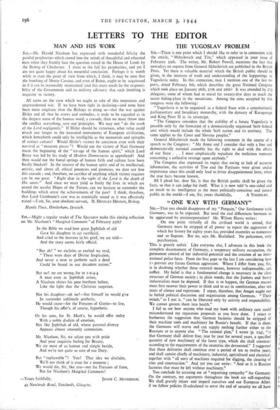MAN AND HIS WORK
LETTERS TO THE EDITOR
Sia,—Mr. Harold Nicolson has expressed with wonderful felicity the painful perplexities which crowd into the minds of thoughtful and educated men when they frankly face the question raised in the House of Lords by the Bishop of Chichester. I share to the full his perplexities, and yet I am not quite happy about his mournful conclusion: Perhaps it is worth while to state the point of view from which, I think, it may be seen that the bombing of Monte Cassino, and even of Rome, ought to be acquiesced in if it can be reasonably maintained (and this must needs be the responsi- bility of the Government arid its military advisers) that such bombing is requisite to victory.
All turns on the view which we ought to take of this monstrous and unprecedented war. If we have been right in declaring—and none have been more emphatic than the Bishops in doing so—that the war against Hitler and all that he avows and embodies, is truly to be regarded as in the deepest sense of the famous word, a crusade, then we must throw into the conflict everything, save our principles. We may not "do the work of the Lord negligently." If Hitler should be victorious, what value could attach any longer to the treasured monuments of European civilisation, which henceforth could only be intelligible as the memorials and epitaphs of extinct culture? Would Hitler's victory be consistent even with their survival as " museum pieces "? Would not the victory of Nazi Germany mean the beginning of the " ice-age of the human spirit," which Lord Bryce was led by his study of Modern Democracies to apprehend? And then would not the fontal springs of human faith and culture have been finally blocked? In the interest of the human spirit and of its intellectual, artistic, and above all, ethical potencies and promises, we dare not lose this crusade ; and, therefore, no sacrifice of anything which victory requires can be too great. "Right dear in the -sight of the Lord is the death of His saints." And since we must yield so freely the lives in which are stored the secular Hopes of the Future, can we hesitate to surrender the buildings which attest the achievements of the past? I think, therefore, that Lord Cranbotne's case was as essentially sound as it was effectively stated.—I am, Sir, your obedient servant, H. HENSLEY HENSON, Bishop.
Hyntle Place, Himlesham, Ipswich.


























 Previous page
Previous page